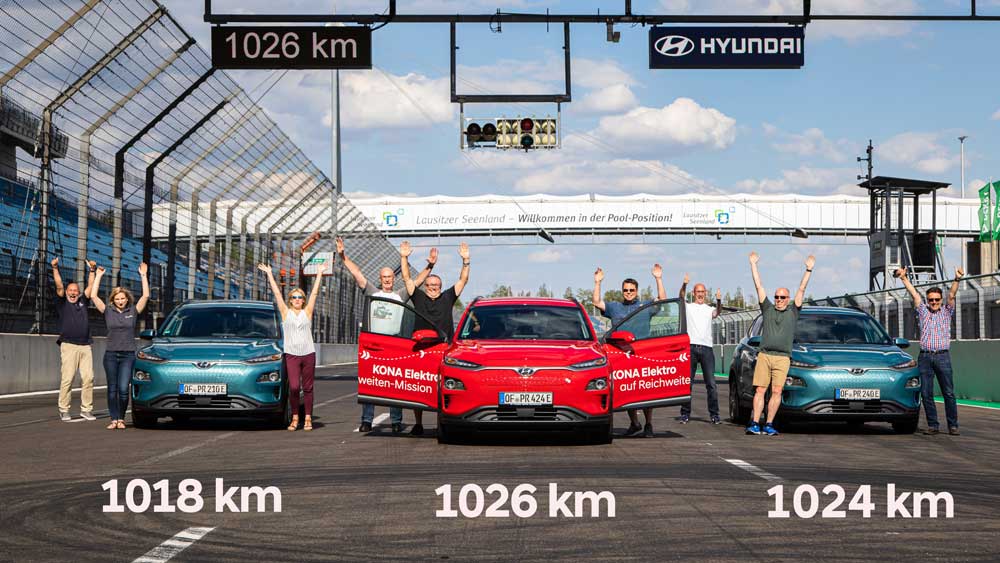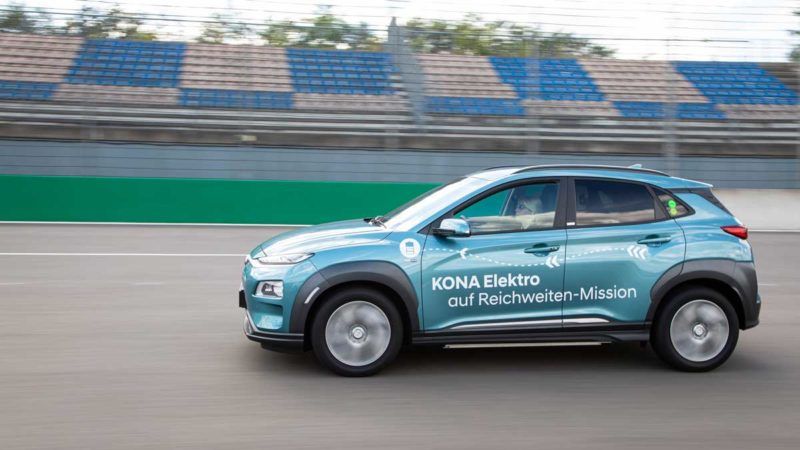Hyundai has sought to put the fear of range anxiety to bed with a new test that shows Hyundai Kona Electric cars with 64kWh battery can drive more than 1,000km on a single charge, underlining the advantage that EVs have over petrol cars when it comes to noise and tailpipe emissions.
The three Kona Electric electric SUVs were each able to drive more than 1,000km (the best at 1,026km) without needing to recharge – more than double the driving range determined for the Hyundai Kona electric using the most common metric known as the Worldwide Harmonised Light Vehicle Test Procedure (WLTP).
The results of the test – conducted over 3 days with three vehicles in Germany in conditions mimicking heavy urban traffic – are impressive for the Hyundai Kona Electric which is already one of the longest range vehicles on the Australian market.
“This mission has proven that our Kona Electric offers outstanding electric performance, efficiency and battery range,” said Michael Cole, president and CEO of Hyundai Motor Europe.
“This lifestyle-oriented vehicle will continue to offer customers a range of sophisticated technology and an attractive design of a small SUV in addition to all the advantages of an environmentally friendly electric vehicle.”
Hyundai said in a statement that all three vehicles were unmodified, factory spec vehicles with standard Nexen N Fera SU1 low rolling resistance tyres in the 215/55R17 size.
In the tests, three driving teams including one from Germany’s Auto Bild auto mag, record an average speed between 29 and 31 km per hour, reflecting typical inner city traffic speeds in European cities.

The outstanding driving range was achievable because of the regenerative braking technology used in many electric vehicles.
Because of the stop and start nature of driving in heavy traffic electric vehicles can recuperate energy back to the battery from the brakes. This also means that electric vehicle brake systems are less likely to need maintenance over the lifetime of the vehicle.
For the Hyundai Kona electric under the conditions of the recent tests this meant that the energy efficiency of the vehicles was greatly improved.
According to Hyundai, power consumption figures as low as 6.24 kilowatt hours per 100km were recorded – much much significantly lower the 14.7 kW hours per 100km determined by the WLTP.
Hyundai says that the vehicles were driven over 3 days and on the third day they covered 20 km of driving with only 3% residual capacity left on the battery. After the battery showed there was no charge left, they continue to drive for several hundred metres before completely running out of power and rolling to a stop.
Anecdotally, The Driven has been told of some Kona Electric owners in Australia reporting that they have achieved driving ranges exceeding 500km on a single charge.
These have been achieved on vehicles bought before Hyundai reported a range tweak would raise its WLTP driving range to 484 km (when and if this specification will be available in Australia is unclear – see more in this article by Bryce Gaton here).
This 35km boost in range, announced by Hyundai in March, has been achieved by reducing drag and rolling resistance combined with a range of chassis design adjustments which are understood to mostly be on the underside of the body, and rolling-resistant tyres.
Hyundai’s announcement of the impressive driving range did not specify if they used the new model with range boosting tweaks, however going off the car maker’s statement of standard energy consumption (14.7kWh/100km), we can presume that the test used the previous model with 449 km driving range (WLTP).
“With this test, the Kona Electric confirmed what many of our customers already know: it is a reliably efficient and eco-friendly lifestyle SUV that is practical for everyday use,” said Jürgen Keller, MD of Hyundai Motor in Germany.
“Customers driving the Kona Electric or other Hyundai EVs can expect to drive long distances without recharging or feeling range anxiety.”

Bridie Schmidt is associate editor for The Driven, sister site of Renew Economy. She has been writing about electric vehicles since 2018, and has a keen interest in the role that zero-emissions transport has to play in sustainability. She has participated in podcasts such as Download This Show with Marc Fennell and Shirtloads of Science with Karl Kruszelnicki and is co-organiser of the Northern Rivers Electric Vehicle Forum. Bridie also owns a Tesla Model Y and has it available for hire on evee.com.au.

